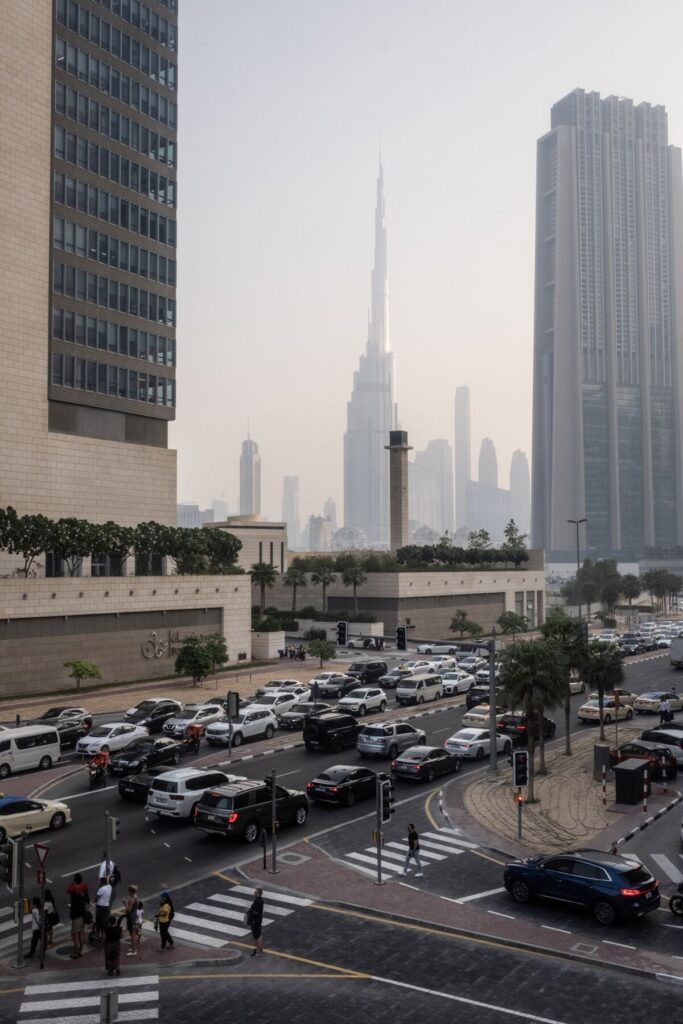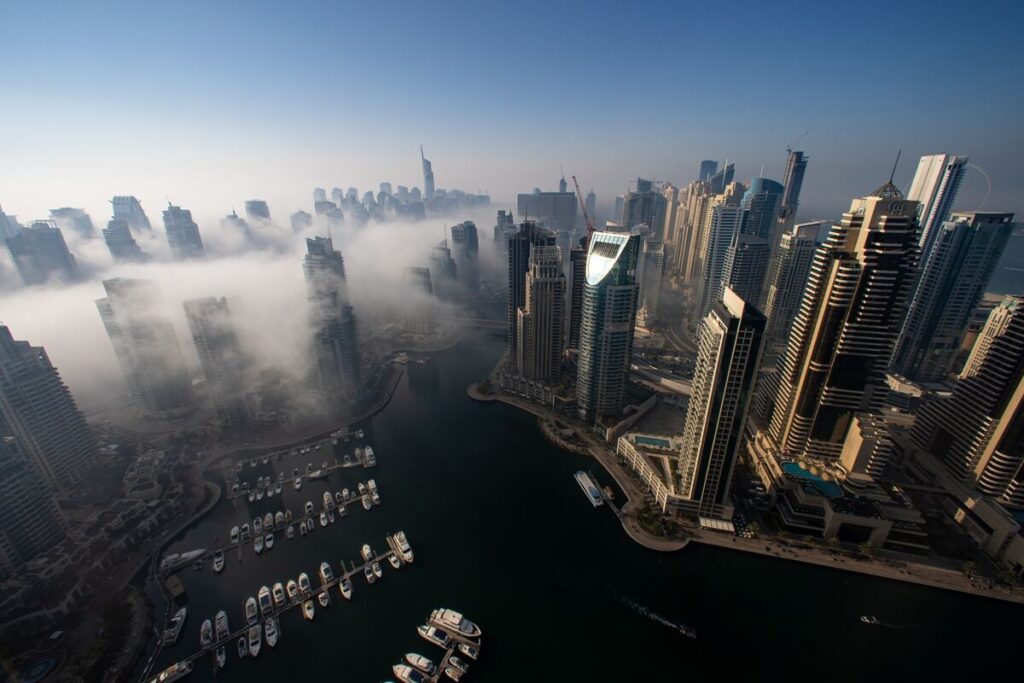February 18, 2024 at 9:00 AM GMT
During the peak of the global pandemic, as Dubai grappled with expatriate departures and rising competition from nearby business centers, the government made pivotal decisions. These choices are currently shielding the city from the commercial real estate downturn sweeping across the world.
The United Arab Emirates, including Dubai, embarked on a departure from the long-standing economic model prevalent in the oil-rich region, which linked residency to employment. Officials broadened the eligibility criteria for long-term ‘golden’ visas, eliminated the requirement for companies to have a local majority partner, transitioned to a Monday-Friday workweek, and legalized cohabitation for unmarried couples.
The objective of policymakers was to transform Dubai’s transient image by attracting expatriates and enticing some to establish businesses, a strategy that appears to be yielding results.
In response to inquiries from Bloomberg, authorities disclosed data for the previous year, unveiling the magnitude of the transformation. In 2023, the city boasted 411,802 active business licenses, marking a 30% surge from 2022 and a 75% increase from 2021.
Recently, Dubai International Financial Centre reported a 26% rise in registered entities in 2023 compared to the previous year, totaling over 5,500. The free-zone now employs approximately 41,600 individuals, representing a 15% increase.
The impact is most pronounced in the emirate’s commercial real estate sector. Unlike other cities such as London and New York, where demand is plummeting, Dubai’s occupancy rates are at record highs. In Dubai’s financial district, DIFC, office space is scarce, and rents continue to climb.
Dubai’s most prominent tower is now up for sale and could fetch up to $1.5 billion. This property in DIFC ranks among Brookfield’s top-performing assets globally, contrasting with other assets that have suffered declining occupancy rates in Los Angeles and London’s Canary Wharf.
Prathyusha Gurrapu, head of research and advisory at Cushman & Wakefield Core, remarked, “The market is quite detached from the trends we see across the world. While many Western markets are still embracing hybrid or work-from-home models, Dubai is experiencing a surge in demand, with nearly everyone back in the office.”
While several external factors have contributed to the influx, including bankers relocating from Asia, wealthy Russians seeking asset protection, crypto investors, affluent Indians searching for secondary residences, and young job seekers from Europe and the broader Middle East, government reforms have facilitated business setup for newcomers.
Ryan Bohl, a senior analyst at risk intelligence consultancy Rane Network, noted the significance of the changes made, suggesting that Saudi Arabia and Qatar may feel compelled to liberalize their economies to compete with Dubai’s economic freedom.
Aside from the commercial property boom, signs of the influx are evident elsewhere, including long waiting lists for schools and clubs, congested roads, and a $5 billion public transit project announced by the government. Policymakers anticipate Dubai’s population will surge to 5.8 million by 2040 from the current 3.5 million.
Residential property prices are nearing record highs, despite mortgage rates being at their highest levels in two decades. Average annual rents for villas have skyrocketed to nearly $88,500. Last year, buyers clamored for $5 million homes, with one developer selling houses worth $844 million within hours. Sales of homes valued at $25 million or more doubled in 2023 at the high end.
One Year at a Time
The recent regulatory changes have brought significant changes to Dubai’s real estate market. According to property broker Betterhomes, end users now make up 44% of property purchases, a notable increase from the 29% recorded in 2019.
Among the expatriates exploring property ownership in Dubai is Jake El-Rasoul, a resident from London. Having resided in the city for a decade, the 40-year-old has been accustomed to living year-to-year, mindful of the possibility of relocating if he lost his job.
However, in May 2022, spurred by the government’s visa reforms, he took a leap and established a financial advisory firm. “I recognized an opportunity and believed it was an opportune moment to launch my own business,” he remarked. “The changes have made the prospect less intimidating, and the flexibility surrounding visas is undoubtedly a major factor.”

Dubai’s financial districtPhotographer: Natalie Naccache/Bloomberg
Government officials throughout the Middle East envision knowledge-based industries as the future and have been investing oil wealth into high-tech sectors. Recognizing the importance of attracting the right talent for such roles, UAE authorities have prioritized providing long-term horizons and predictability, which are crucial factors for executive decision-making. Golden visas offer a degree of assurance in this regard, even though citizenship largely remains inaccessible.
While Saudi Arabia has also introduced initiatives to enhance Riyadh’s appeal as a destination, several challenges persist. A key consideration is whether the country is prepared, from an infrastructure, housing, lifestyle, and administrative perspective, to accommodate an influx of foreign white-collar workers and their families. Additionally, there is uncertainty regarding whether individuals will forsake the comparatively more liberal and cosmopolitan environment of Dubai to relocate to Saudi Arabia.
As for El-Rasoul, he intends to establish Dubai as his home for at least the next decade. “It seems like more people are choosing to settle here for the long term,” he remarked. “Dubai has undergone significant changes in that regard.”
Oil Wealth
A significant attraction is the Middle East’s vast oil wealth — Abu Dhabi, the capital of the UAE, hosts state funds managing $1.5 trillion in assets, prompting numerous multinational firms to contemplate expansion in the region.
Nathan Gatland, director at Open Hub, notes that his firm currently assists in setting up approximately 80 companies per month on average, a substantial increase from the 25 trade licenses issued per month a year earlier. This growth persists despite the UAE’s introduction of corporate tax.
“I anticipated that corporate tax would have a detrimental impact, but we’ve observed larger companies gravitating here due to the market potential,” Gatland remarked. “When they relocate staff to this region, it unlocks a whole new market where many high net worth individuals are relocating.”
However, certain limitations persist. One such concern revolves around the fate of residents when they cease employment. Dubai must establish retirement programs and health insurance schemes to enable residents to retire within the city, as emphasized by Renee McGowan, CEO of India, Middle East & Africa at Marsh McLennan.
Moreover, Dubai’s diminishing tax-free status may impede its ability to attract more foreigners. Alongside corporate tax, the UAE implemented value-added taxes in 2018, adding to the array of government fees on services in a city that already ranks among the world’s most expensive.
“Dubai and the UAE, in general, are grappling with conflicting priorities of fostering comparative advantage to retain residents on one hand, while rationalizing budgets through tax increases and broadening the tax base,” remarked Rane Network’s Bohl.

